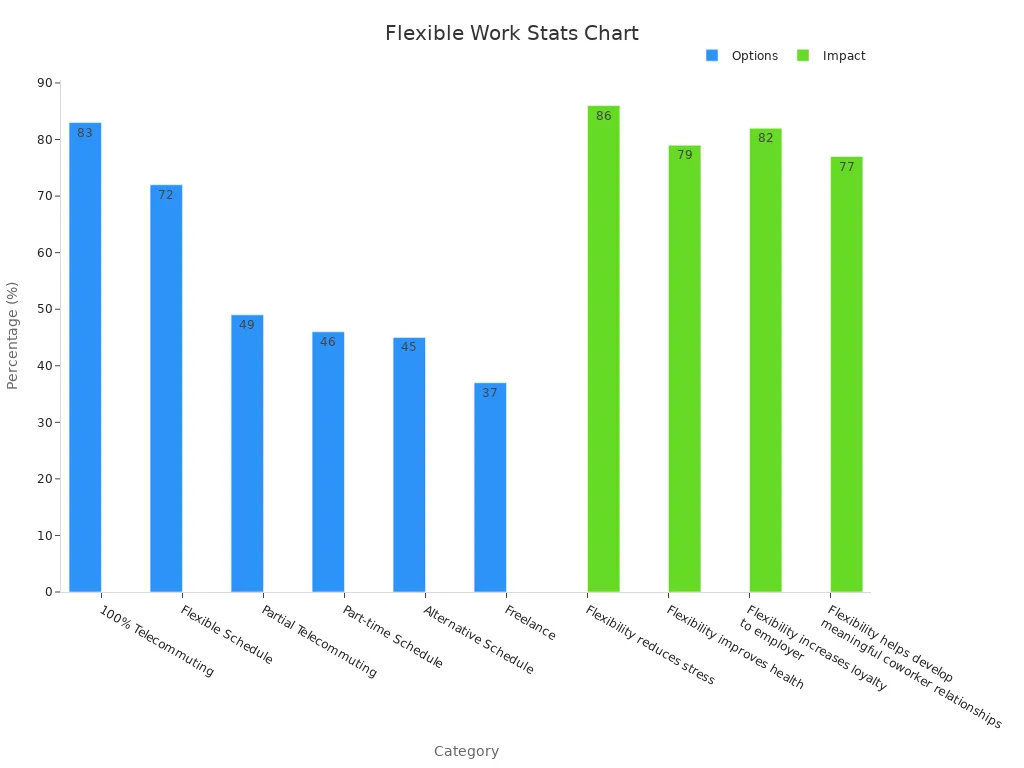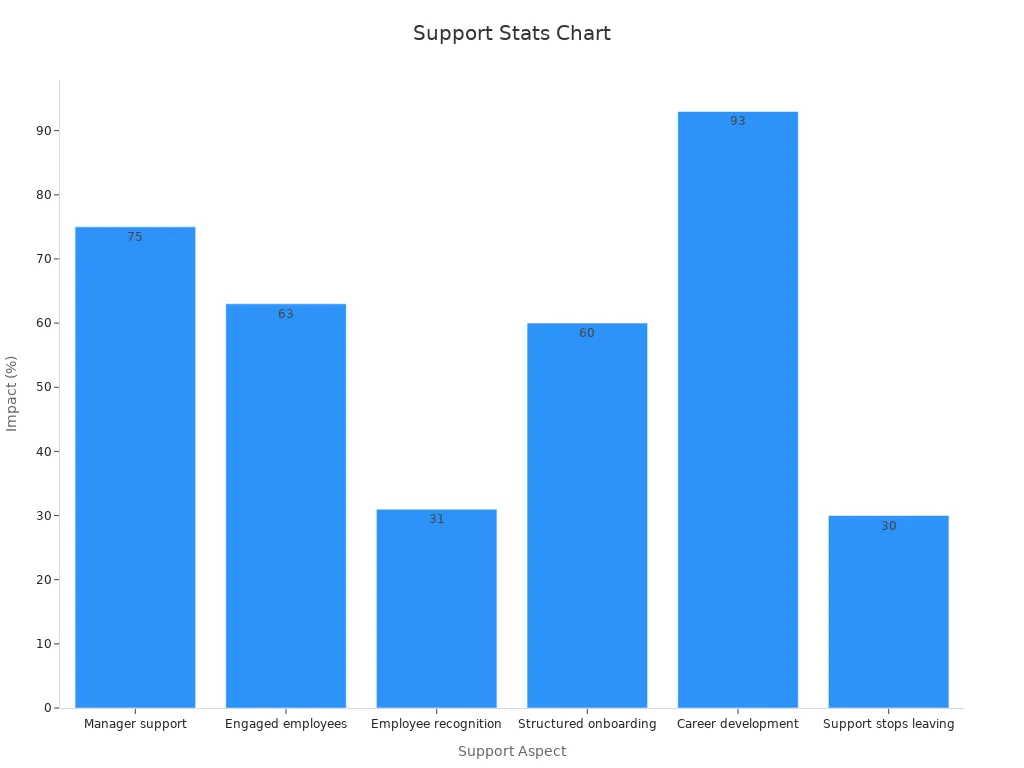
Some mornings, I hold a lunchbox in one hand. I check a work email on my phone with the other. I see that working parents like me feel busy and tired. We try to finish work and read bedtime stories. “You’re doing better than you think.” This small reminder helps me keep going. It shows me why having a support system is important.
Why a Support System Matters
Challenges for Working Parents
Every morning in my house feels like a race. I juggle breakfast, school bags, and reminders about library books. My phone buzzes with work messages before I’ve even had coffee. I know I’m not alone—most working parents I talk to feel stretched thin. We try to give our best at work and still show up for our kids’ big and small moments. Some days, I feel like I’m everywhere at once. Other days, I worry I’m not enough anywhere.
The biggest challenge for me is finding time. There’s always something—an unexpected meeting, a sick child, a forgotten permission slip. I’ve noticed that when work gets busy, family routines slip. We eat more takeout, skip family walks, and bedtime stories get shorter. I’ve read that when parents feel more work-life stress, family meals and healthy habits often fall by the wayside. I see this in my own home. When I’m overwhelmed, I don’t have the energy to cook or play. My patience runs thin.
It’s not just about time. Stress builds up, especially when support is missing. I remember a week when my youngest had a fever, and I had back-to-back meetings. I felt guilty for missing work and guilty for not being fully present with my child. That’s a heavy load to carry. I’ve learned that parents, especially moms, often do more unpaid work at home after their paid jobs end. We try to keep everything running, but it’s easy to feel burned out.
“You are not failing. You are doing your best with what you have.”
I’ve also noticed that stress hits harder for single parents or those with less help. Money worries, lack of paid leave, or not having flexible work hours make everything tougher. Even in two-parent homes, if one person carries most of the load, resentment and exhaustion can build. It’s no wonder that parents report higher stress than people without kids. Sometimes, it feels like there’s no room for mistakes or emergencies.
Why Support Is Needed
I used to think I had to do it all myself. Over time, I realized that asking for help isn’t weakness—it’s survival. A support system makes all the difference. When I have someone to call for backup, or a boss who understands if I need to leave early, I feel lighter. I can breathe. I can show up better for my kids and my job.
A strong support system can look different for everyone. For me, it’s a mix of family, friends, and understanding coworkers. Sometimes, it’s a neighbor who grabs my son from the bus stop. Other times, it’s a partner who takes over dinner duty when I’m wiped out. I’ve learned that when support is shared—when household tasks and emotional loads are divided—everyone copes better. The whole family feels more connected and less stressed.
Here’s what I’ve noticed about why support is so important for working parents:
When I feel supported at home and work, I’m more likely to ask for help instead of bottling things up.
Having flexible leave or understanding supervisors means I don’t have to choose between my job and my child’s needs.
Supportive environments at work and home help me manage stress and avoid burnout.
When I have backup, I can handle surprises—like a sick child or a late meeting—without falling apart.
Family satisfaction and a sense of teamwork protect my wellbeing, even when life gets messy.
I’ve read that parents with more support—whether from family, friends, or their workplace—report less stress and better work-life balance. Even small gestures, like a friend checking in or a manager offering flexible hours, can make a huge difference. In fact, when workplaces offer real support, not just policies on paper, parents feel more satisfied and less overwhelmed.
“It’s okay to lean on others. We’re not meant to do this alone.”
I’m still figuring this out, and some days we nail it, some days we don’t. But I know that building a support system isn’t just about making life easier. It’s about protecting our wellbeing and creating a more loving, less stressful home for our kids. If you’re feeling stretched, you’re not alone. Reaching out for help is one of the bravest things we can do as parents.
Forms of Support for Working Parents

Flexible Work Options
Flexible work can really help working parents. When I got a job with a flexible schedule, I felt better. I could take my son to the doctor and not miss work. Many parents want more control over their time. Here are some numbers:
Percentage of Working Parents Demanding It | |
|---|---|
100% Telecommuting | 83% |
Flexible Schedule | 72% |
Partial Telecommuting | 49% |
Part-time Schedule | 46% |
Alternative Schedule | 45% |
Freelance | 37% |

When I have a hybrid job and people support me, I feel less stress. I am more focused at home. “You should have a schedule that works for you.”
Parenting Groups and Community
I thought I had to do everything alone. Then I joined a parenting group. I found people who understood my worries and busy mornings. Parenting groups, online or in person, are safe places to share advice and laugh. I see parents become more sure of themselves and less lonely. Peer mentoring and employee resource groups help us make real friends. “We help each other get stronger.”
Family-Friendly Policies
Family-friendly policies like paid leave and flexible time off help a lot. When my job gives these benefits, I feel important and cared for. A workplace with good communication helps everyone do well. Here is a quick look at the effects:
Percentage of Total Benefits | |
|---|---|
Reduced Stress | 30% |
Improved Work-Life Balance | 25% |
Increased Job Satisfaction | 20% |
Increased Productivity | 15% |
Other Benefits | 10% |
“Policies that help families help everyone.”
Resources and Wellbeing Programs
Wellbeing programs help me find balance. Mental health support, leadership training, and flexible classes really help. When jobs offer benefits for wellbeing, I feel like they care about me. Hybrid jobs, mentoring, and family wellness programs keep me close to what matters. “Taking care of yourself helps your family too.”
Some days we do great, some days we don’t. But with the right support, we are never alone.
Benefits for Families and Organizations

Positive Impact on Parents and Kids
When I feel supported, my kids notice it too. A strong support system at home and work helps me stay patient. I have more energy for bedtime stories and family walks. When parents get help, kids do better in school and focus more. They have fewer tantrums. Warm, supportive parenting helps my boys handle tough days. Our home feels happier and calmer when we work together.
“When you feel supported, your kids feel it too.”
Simple things help, like talking with teachers or joining a parenting group. These boost kids’ confidence and social skills. I’ve read that kids with involved parents behave better and get better grades. It’s not about being perfect. It’s about showing up and asking for help when needed.
Organizational Advantages
Support at work helps families and organizations. I feel more loyal and focused when my manager checks in. Flexible hours let me care for my kids. Here’s what I’ve learned:
Supportive workplaces have less burnout and more job satisfaction.
Employees who feel recognized are less likely to leave.
When organizations invest in family wellness, everyone benefits.
Support System Aspect | Impact on Retention |
|---|---|
Employees feeling supported by manager | 75% report higher engagement levels |
Engaged employees | 63% less likely to look for a new job |
Employee recognition | Lowers voluntary turnover by 31% |
Career development investment | 93% more likely to remain with the organization |

“Happy parents make better employees.”
Building a Strong Support System
What helps at home and work? Open talks, small acts of kindness, and asking for help. When families and organizations work together, everyone feels better. Programs that let employees shape their own wellness plans make real changes. Community partnerships and parent-led groups build trust and real support.
“Some days we nail it, some days we don’t. But together, we’re stronger.”
Building support takes time. It means showing up, listening, and celebrating small wins. A quiet cup of coffee or a drawing on the fridge can be enough. We’re all learning as we go, and that’s okay.
I have noticed that support systems help working parents do well. Flexible schedules, hybrid jobs, and caring groups really help families. These things make life easier for parents at home and at work.
What Helps Most | Why It Matters |
|---|---|
Flexible Scheduling | Lets parents handle family needs |
Hybrid Work | Balances job and home life |
Reduces stress and boosts happiness |
“We’re stronger together—every small act of support counts.”


